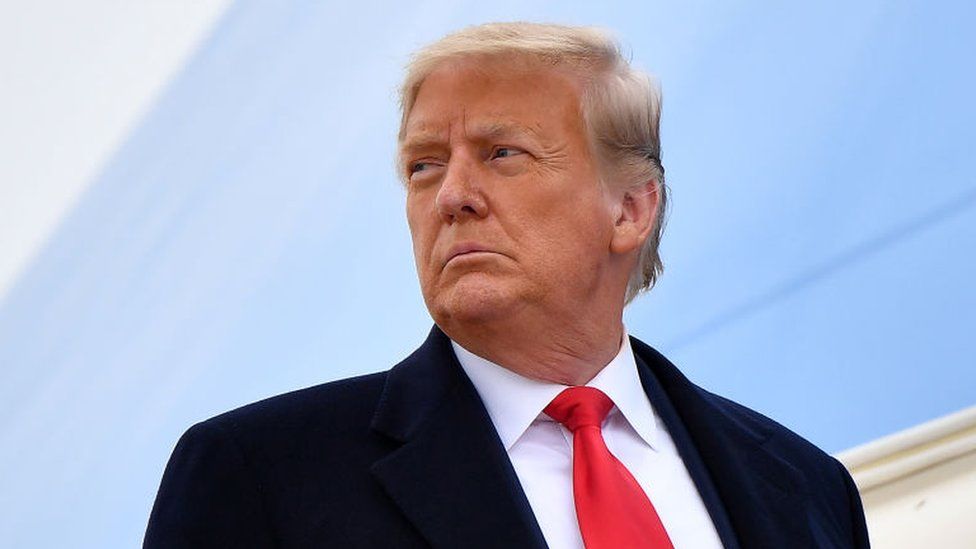
Donald Trump's impeachment trial over his role in the deadly US Capitol riot is poised to begin next week in the Senate, according to Democrats.
On Monday, the House of Representatives will deliver the impeachment charge to the Senate, triggering the trial process in the 100-member chamber.
Republicans had argued for a delay, asking for more time to prepare.
Mr Trump's upcoming trial will be the only one ever to have taken place after a president has left office.
Mr Trump flew to Florida as his term ended on Wednesday, skipping his successor Joe Biden's inauguration.
The House of Representatives last week charged Mr Trump with inciting a deadly riot at the US Capitol, paving the way for a Senate trial. If convicted, he could be barred from future office.
Top Senate Democrat Chuck Schumer said on Friday that the House would deliver the impeachment article on Monday. Unless Democrats, who took control of the Senate this week, change the rules, it will mean Mr Trump's trial will begin on Tuesday.
"The Senate will conduct a trial of the impeachment of Donald Trump. It will be a full trial. It will be a fair trial," Senate Majority Leader Schumer said on the floor of the Senate.
Mr Trump's actions ahead of the 6 January riot are at the heart of the case. The then president told protesters near the White House to "peacefully and patriotically" make their voices heard as they prepared to march towards the US Capitol building. He also told them to "fight like hell".
The demonstration turned ugly as a mob forced its way into the congressional complex where lawmakers were certifying Mr Biden's election victory.
Four protesters and a Capitol Police officer died in the mayhem.
A week later, Mr Trump became the first US president to be impeached twice.


Impeachment: The basics
- What is impeachment? Impeachment is when a sitting president is charged with crimes. In this case, former President Trump is accused of having incited insurrection
- What has already happened? The House of Representatives voted to impeach Mr Trump for a second time on 13 January, shifting the process to the Senate for a trial - but that trial could not be carried out before he left office on 20 January
- So what does it mean? A trial can still happen although Mr Trump's term has ended, and senators can vote to bar him from holding public office again

What did Republicans ask for?
On a call to his fellow Republican senators on Thursday, Senate minority leader Mitch McConnell said he had asked House Democrats to hold off sending the single impeachment article to the Senate until 28 January - the move that would kick-start the trial's first phase.
Under this timetable, Mr Trump would then have two weeks - until 11 February - to submit his pre-trial defence. Arguments would be expected to begin in mid-February.
Republicans, who as of Wednesday no longer control the Senate, needed the new Democratic majority leader, Mr Schumer, to agree to the idea.
Mr McConnell said in a statement: "Senate Republicans are strongly united behind the principle that the institution of the Senate, the office of the presidency, and former President Trump himself all deserve a full and fair process that respects his rights and the serious factual, legal, and constitutional questions at stake."
Senator John Cornyn of Texas told Reuters that he and fellow Republicans had been discussing the need to allow Mr Trump "due process".
Ten House Republicans sided with Democrats in impeaching the outgoing president on 14 January.
Even though Democrats now narrowly control the Senate, they would need the support of at least 17 Republicans in order to convict Mr Trump, because a two-thirds vote is required.
A handful of Senate Republicans have indicated they are open to conviction, but most have either cast doubt on the legality of trying a president after he has left office, or said the process would be too divisive.

A dilemma for Democrats

The Senate majority leader said the House of Representatives will deliver the articles of impeachment on Monday. Unless the Senate changes its rules, that means the trial will begin on Tuesday.
Some Democrats would have welcomed McConnell's offer of a two-week postponement, as it could have given the Senate some more time to confirm presidential appointments and begin work on its legislative agenda. Before his inauguration, Joe Biden expressed concern about being unable to quickly staff his administration and recommended the Senate try to conduct a part-time trial while doing other business.
Democrats demanding a speedy trial appear to have won the day, however. They fear a long delay might make it the easier for Republicans to acquit the president, as the Capitol Hill insurrection fades into the past.
Since the Democrats control both chambers of Congress, they're the ones who get to set the timetable and make the rules. It marks a sharp contrast from the last Trump impeachment, where Republicans had the Senate majority and McConnell was in charge.

Speaker Pelosi has the ultimate power over the timing. She declined to answer journalists' questions on Thursday about when she would submit the charge, and it was Mr Schumer on Friday who announced her plans.
In her news conference on Thursday, Mrs Pelosi said Mr Trump did not deserve a "get out of jail card" just because he had left office.
What does the Constitution say?
The rules set out in the US Constitution say that by 13:00 ET on the day following the submission of an impeachment article, the Senate must convene to begin the trial.
The Senate sergeant-at-arms begins the proceedings by warning lawmakers - who will act as jurors - "to keep silence, on pain of imprisonment".
The trial must then continue every day - barring Sundays - until a verdict is rendered.
Where is Trump now?
Donald Trump left the White House on Wednesday morning and flew on Air Force One to his golf club in Palm Beach, Florida.
His motorcade passed hundreds of well-wishers before he arrived at Mar-a-Lago minutes before Mr Biden took the oath of office in Washington DC just before noon.
Mr Trump is expected to live at the resort he calls his "Winter White House", despite concerns from some neighbours about the increased traffic and heightened security.
He is planning to maintain a tight-knit coterie of former White House aides in Florida.
According to reports, he wants to raise $2bn (£1.46bn) for his presidential library and has floated the idea of forming a new political party called the Patriot Party.
Who will defend Trump?
Mr Trump has hired South Carolina-based lawyer Butch Bowers to represent him in his Senate impeachment trial, according to Senator Lindsey Graham.
According to his website, Mr Bowers was a special counsel on voting matters at the US Department of Justice under President George W Bush.
He also served as counsel to two former governors of South Carolina, Nikki Haley and Mark Sanford.
https://news.google.com/__i/rss/rd/articles/CBMiM2h0dHBzOi8vd3d3LmJiYy5jby51ay9uZXdzL3dvcmxkLXVzLWNhbmFkYS01NTc2MTA0NNIBN2h0dHBzOi8vd3d3LmJiYy5jby51ay9uZXdzL2FtcC93b3JsZC11cy1jYW5hZGEtNTU3NjEwNDQ?oc=5
2021-01-22 15:50:00Z
52781322316585
Tidak ada komentar:
Posting Komentar